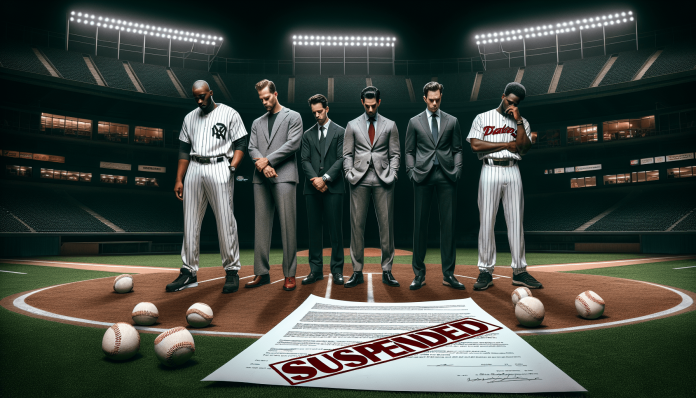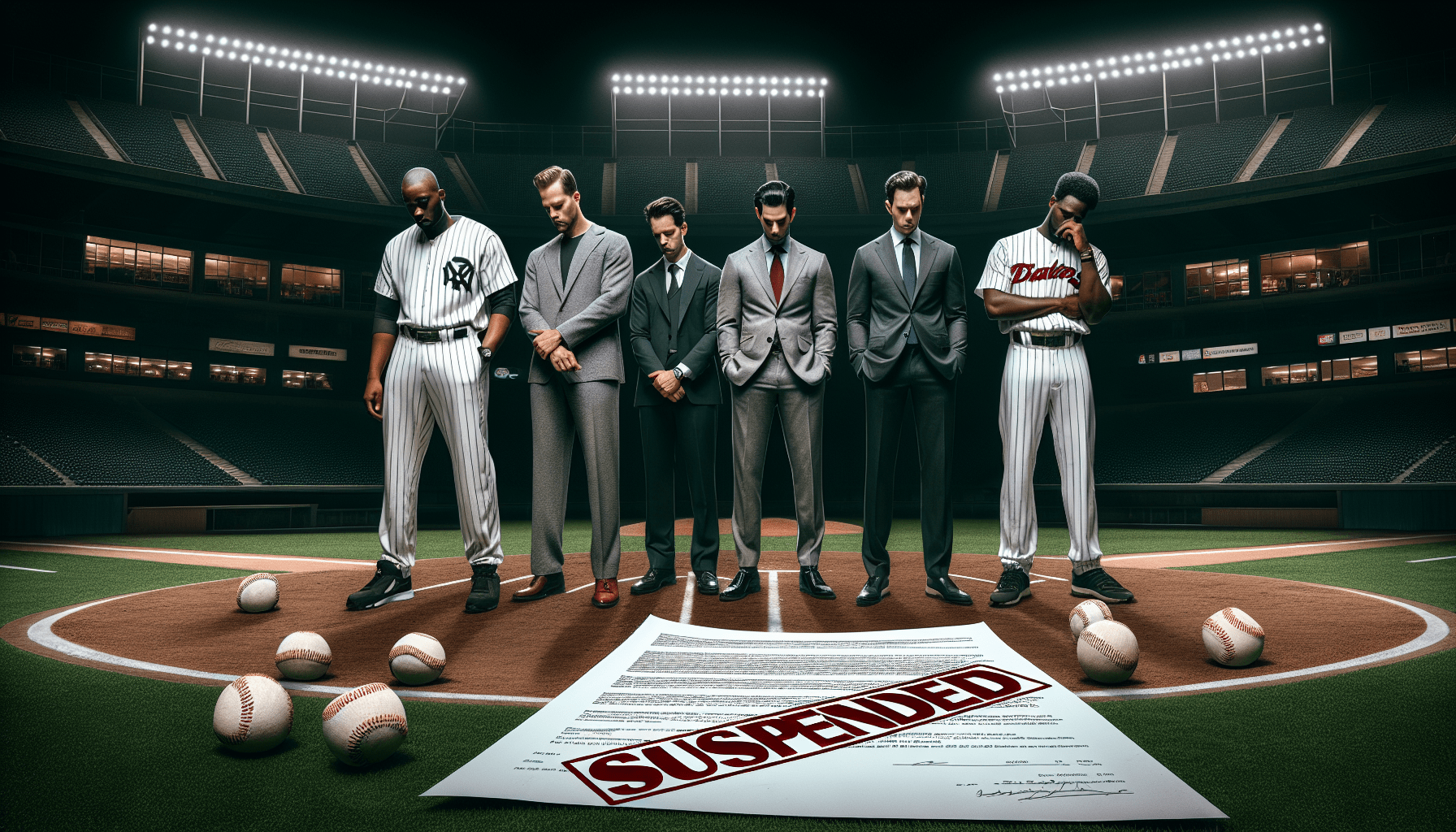
⚾ Introduction
Gambling scandals have long plagued professional sports, with Major League Baseball (MLB) being no exception. The history of MLB players suspended for gambling is both storied and controversial, reflecting the sport’s ongoing struggle to maintain integrity amidst growing temptations.
📜 Historical Context of Gambling in Baseball
🔙 Early Instances and the Black Sox Scandal
The relationship between baseball and gambling dates back over a century. The most infamous early incident is the 1919 Black Sox Scandal, where eight Chicago White Sox players were accused of intentionally losing the World Series in exchange for money from gamblers. This scandal rocked the sport, leading to the lifetime bans of the involved players and the establishment of a commissioner’s office to restore integrity to the game.
⚖️ The Creation of MLB’s Strict Gambling Policies
📏 Commissioner Kenesaw Mountain Landis
In response to the Black Sox Scandal, Judge Kenesaw Mountain Landis was appointed as MLB’s first commissioner. Landis implemented strict anti-gambling policies, including lifetime bans for any player caught gambling on baseball games. These rules were designed to preserve the sport’s integrity and prevent any similar incidents from occurring in the future.
📉 Modern Gambling Scandals in MLB
💣 Pete Rose: A Cautionary Tale
Pete Rose, one of baseball’s greatest hitters, became a cautionary tale in modern times. In 1989, Rose was banned for life from baseball after it was discovered that he had bet on games while managing the Cincinnati Reds. Despite his achievements on the field, Rose’s legacy remains tarnished, and he continues to be excluded from the Hall of Fame.
🎲 The Impact on Rose’s Career and Legacy
🏅 Achievements Overshadowed
Pete Rose’s betting scandal significantly overshadowed his remarkable career. Despite being the all-time leader in hits, Rose’s eligibility for the Hall of Fame remains a contentious issue, highlighting the severe consequences of gambling in baseball.
📋 Recent Suspensions and Their Implications
📰 Recent High-Profile Suspensions
In recent years, several MLB players have faced suspensions for gambling-related activities, reflecting the ongoing challenges the league faces in combating this issue.
🚫 Example Cases
🃏 Case 1: Alex Rodriguez
📝 Investigation and Outcome
In 2013, Alex Rodriguez was implicated in a high-profile investigation involving illegal poker games. Although the primary issue was related to performance-enhancing drugs (PEDs), his involvement in gambling activities added to the controversy surrounding his career. While not suspended specifically for gambling, the incident highlighted the ongoing intersection of gambling and other forms of misconduct in MLB.
🎰 Case 2: MLB and Fantasy Sports
📊 The Rise of Fantasy Sports and Daily Fantasy Platforms
The advent of fantasy sports and daily fantasy platforms has created a new landscape for gambling in sports. While MLB initially embraced these platforms, concerns about potential conflicts of interest and gambling issues have led to increased scrutiny and regulation.
💼 MLB’s Current Policies on Gambling
📜 Policy Overview
MLB maintains strict policies regarding gambling to uphold the sport’s integrity. These policies prohibit players, coaches, and officials from betting on baseball games, with severe penalties for violations.
🕵️ Enforcement and Education
👩🏫 Preventative Measures
To prevent gambling-related issues, MLB has implemented educational programs for players and staff, emphasizing the risks and consequences of gambling. Regular monitoring and investigations ensure compliance with these policies.
🔄 The Evolution of Gambling Laws and MLB’s Response
📉 Changes in Legal Landscape
The legal landscape surrounding sports betting has evolved significantly, with many states legalizing sports gambling. This shift has required MLB to adapt its policies and strategies to address the changing environment.
💡 Adapting to New Realities
🔧 Policy Adjustments
MLB has adjusted its policies to reflect the new realities of legalized sports betting. This includes partnerships with gambling companies to ensure transparency and integrity while maintaining strict rules for those directly involved in the game.

🌟 Impact on Players and the League
💡 Challenges and Opportunities
The relationship between MLB and gambling presents both challenges and opportunities. While strict policies are necessary to maintain integrity, the league also recognizes the potential benefits of engaging with the regulated gambling industry.
📊 Balancing Act
⚖️ Maintaining Integrity vs. Revenue Generation
MLB must balance the need to maintain the integrity of the game with the potential revenue from partnerships with gambling companies. This requires careful regulation and clear guidelines to prevent conflicts of interest and ensure fair play.
🌐 Public Perception and Future Outlook
📢 Public Perception of Gambling in Baseball
Public perception of gambling in baseball remains mixed. While some fans are more accepting of regulated sports betting, others remain wary of its impact on the integrity of the game.
📈 Future Trends
🔮 Evolving Attitudes and Regulations
As attitudes towards sports betting continue to evolve, MLB will need to adapt its policies and strategies. Ongoing education, regulation, and transparency will be crucial in maintaining the trust of fans and ensuring the sport’s integrity.
📝 Conclusion
🔍 Reflecting on the Past and Looking Ahead
The history of MLB players suspended for gambling highlights the sport’s ongoing struggle to maintain integrity in the face of evolving challenges. From the Black Sox Scandal to modern-day issues, MLB has worked to enforce strict policies and adapt to changing legal landscapes. The future will undoubtedly bring new challenges and opportunities, but the commitment to upholding the integrity of the game remains paramount.
🚀 Call to Action
📣 Staying Informed and Engaged
Fans and stakeholders must stay informed and engaged as MLB navigates the complex relationship between sports and gambling. By understanding the history, policies, and future trends, everyone can contribute to ensuring the integrity and future success of Major League Baseball.



















